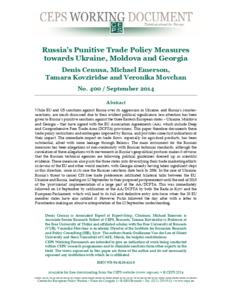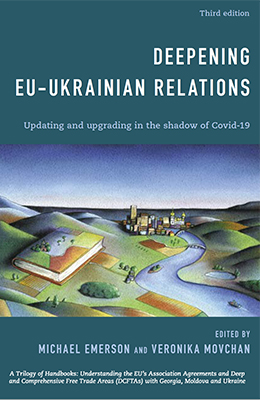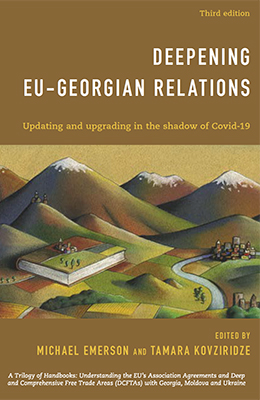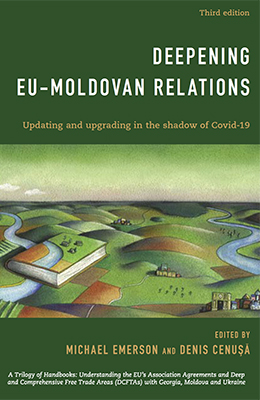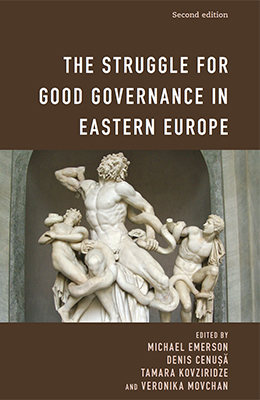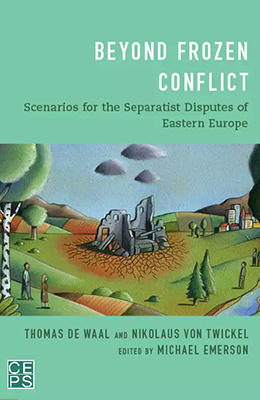
Ukraine’s Alarming Demographics
The task of Ukraine’s reconstruction and recovery is thus far seeing most attention devoted to the economics of repairing physical capital assets. However, the losses of human…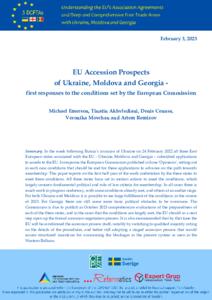
EU Accession Prospects of Ukraine, Moldova and Georgia — first responses to the conditions set by the European Commission
In the week following Russia’s invasion of Ukraine on 24 February 2022 all three East European states associated with the EU – Ukraine, Moldova and Georgia – submitted applications to accede to the EU. In response the European Commission published…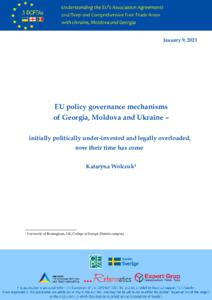
EU policy governance mechanisms of Georgia, Moldova and Ukraine – initially politically under-invested and legally overloaded, now their time has come
Russia’s aggression against Ukraine has thrown the EU policy towards its East European neighbours into the spotlight. The EU member states responded to the challenge presented to European security by granting candidate status to Ukraine and Moldova…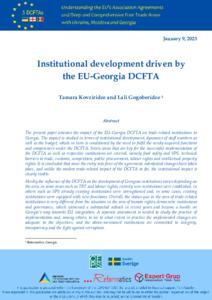
Institutional development driven by the EU-Georgia DCFTA
The present paper assesses the impact of the EU-Georgia DCFTA on trade-related institutions in Georgia. The impact is studied in terms of institutional development, dynamics of staff numbers as well as the budget, which in turn is conditioned…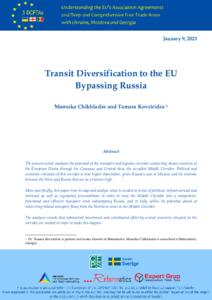
Transit Diversification to the EU Bypassing Russia
The present article analyses the potential of the transport and logistics corridor connecting Asian countries to the European Union through the Caucasus and Central Asia, the so-called Middle Corridor. Political and economic relevance of…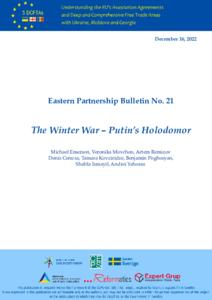
EaP Bulletin No 21: The Winter War – Putin’s Holodomor
All his military strategies having failed so far, in his desperation Putin is now engaged in a genocidal campaign to freeze the citizens of Ukraine to mass death by hyperthermia, through bombing the electricity infrastructure into destruction.…
The $300 Billion Question: How to get Russia to pay for Ukraine’s reconstruction
As the scale of Russia’s destruction of Ukrainian infrastructure increases by the day, the issue on how reconstruction is going to be paid for rises ominously on the EU and G7’s agenda. While preparations are underway on how to organise and fund reconstruction,…
Next Steps for EU Enlargement – Forwards or Backwards?
The EU’s present enlargement process, once applauded as the EU’s most successful foreign policy, is not working well. With the addition of candidate status for Ukraine and Moldova the case for a serious reform of existing procedures is widely…
Ex-post evaluation of the implementation of the Deep and Comprehensive Free Trade Area between the EU and its Member States and Georgia
The Deep and Comprehensive Free Trade Area (DCFTA) between the European Union (EU) and its Member States and Georgia, provisionally in force since 2014, is the economic and trade pillar of the EU-Georgia Association…
Ex-post evaluation of the implementation of the Deep and Comprehensive Free Trade Area between the EU and its Member States and Moldova
The Deep and Comprehensive Free Trade Area (DCFTA) between the European Union (EU) and its Member States and the Republic of Moldova, provisionally in force since 2014,
Will the European Political Community actually be useful?
On 6 October 2022 there will be an inaugural EU meeting at summit level, with the EU’s close neighbours also invited, to debate security and stability as part of a budding European Political Community (EPC), as proposed by President Macron with support…
Understanding Russia’s perception of international agency in the context of the war against Ukraine
Russia’s invasion of Ukraine has dominated international politics in 2022 and this looks likely to continue for the foreseeable future. But how did we get to this point in the first place? The core argument presented here is that Russian foreign policy…
Taking the road away from Europe – how far could Georgia go (and can it be reversed)?
Earlier this year, as a result of the Russian invasion of Ukraine, Moldova and Ukraine were granted official EU candidate status… but not Georgia. Instead, Georgia has been left behind on the waiting list, with its application due to be reevaluated…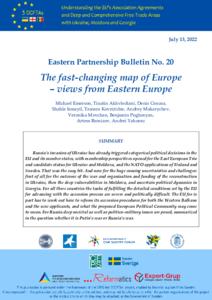
EaP Bulletin No 20: The fast-changing map of Europe – views from Eastern Europe
Russia’s invasion of Ukraine has already triggered categorical political decisions in the EU and its member states, with membership perspectives opened for the Trio and candidate status for Ukraine and Moldova, and the NATO applications…
Interpreting the Commission Opinions on the membership applications of Ukraine, Moldova and Georgia, and next steps for the European Council
The Commission’s three Opinions on the membership applications of Ukraine, Moldova and Georgia, if endorsed by the European Council as seems likely on 23-24 June, will mark a geopolitical turning point for Europe, bringing the three…
The New Agenda for the EU’s Enlargement and Neighbourhood Policies
The war in Ukraine, triggering membership applications from Ukraine, Moldova and Georgia and coming on top of widespread calls for reinvigorating the stagnant accession process in the Western Balkans, has led Presidents Emmanuel Macron and Charles…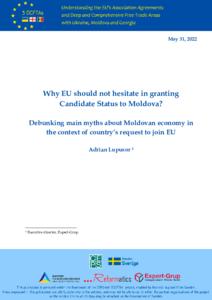
Why EU should not hesitate in granting Candidate Status to Moldova? Debunking main myths about Moldovan economy in the context of country’s request to join EU
The Republic of Moldova signed the request to join EU on the second week after the Russian invasion in EU. This was a logical step for a country looking for a peace and development anchor amid unfolding security threats.…
Georgia’s dubious application for EU membership
Barely a week after Russia’s invasion of Ukraine, Georgia submitted its application to accede to the EU on 3 March, following Ukraine and alongside Moldova. The European Commission has been invited by the European Council to deliver its ‘Opinion’ on…
Opinion on Moldova’s application for membership of the European Union
This paper responds to Moldova’s request of 3 March 2022 to accede to membership of the European Union. The European Council meeting at Versailles on 10-11 March endorsed the Council’s invitation to the European Commission to produce an Opinion on…
Opinion on Ukraine’s application for membership of the European Union
This paper responds to Ukrainian President Volodymyr Zelensky’s request on 28 February 2022 for his country to accede to membership of the European Union. The European Council meeting at Versailles on 10-11 March endorsed the Council’s invitation to…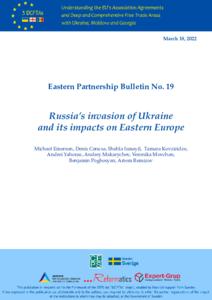
EaP Bulletin No 19: Russia’s invasion of Ukraine and its impacts on Eastern Europe
From Ukraine the first essential observation is that the Russian Blitzkrieg, originally intended to secure control of Kyiv and overthrow the government within a week or two, has failed. The advance on Kyiv seems halted. Public opinion…
Russia invades Ukraine: a European war that affects us all
It has happened. The dark spectre that has been looming large over Europe for weeks has now finally come to pass. Russia has launched an invasion of Ukraine, an invasion that is without any justification whatsoever. In defiance of international appeals…
Will Putin choose war, death and destruction?
Language, as in the above title, would today be decried by the Kremlin’s propaganda machine as Russophobic hysteria. Tomorrow, it may be a brutal, tragic, objective reality. When it comes to war, all parties must decide where they stand. For Ukrainians…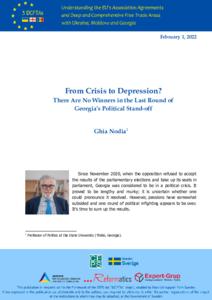
From Crisis to Depression? There Are No Winners in the Last Round of Georgia’s Political Stand-off
Since November 2020, when the opposition refused to accept the results of the parliamentary elections and take up its seats in parliament, Georgia was considered to be in a political crisis. It proved to be lengthy and murky; it is uncertain…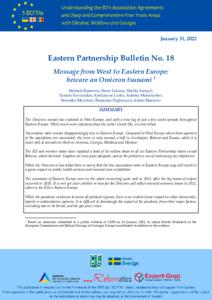
EaP Bulletin No 18. Message from West to Eastern Europe: beware an Omicron tsunami
The Omicron variant has exploded in West Europe, and with a time lag of just a few weeks spreads throughout Eastern Europe. While much more infectious than the earlier Covid-19s, it is less lethal.
Russia’s threat to invade Ukraine and Europe’s soft power
Vladimir Putin’s threat to invade Ukraine forces all parties to make their calculations with three fundamental variables. The first two have dominated public debate so far: the preparedness of Russia to go to war, and the possible impact of Western…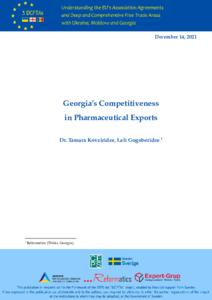
Georgia’s competitiveness in pharmaceutical exports
This paper is aimed at exploring Georgia’s potential in pharmaceutical production and export to the EU as well as to other countries. More specifically, it focuses on the analysis of production and export of medicines of the product…
Strategic Implications of the Green Deal for the Eastern Partnership
An input paper prepared for the third network workshop organized by the Network of Think Tanks on the Eastern Partnership, DGAP, 25 November 2021 The Green Deal is a very…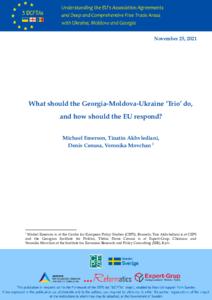
What should the Georgia-Moldova-Ukraine ‘Trio’ do, and how should the EU respond?
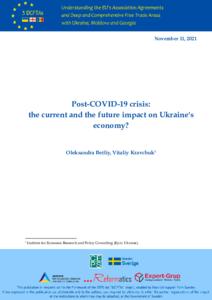
Post-COVID-19 crisis: the current and the future impact on Ukraine's economy?
The impact of COVID-19 on Ukraine's economy is twofold. On the one hand, it had clear short-term negative economic consequences, primarily in 2020. Real GDP declined due to a sharp drop in gross fixed capital formation as investment…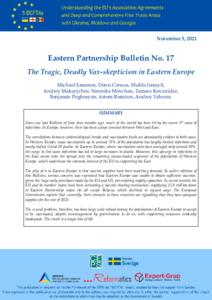
EaP Bulletin No 17: The Tragic, Deadly Vax-scepticism in Eastern Europe
Since our last Bulletin of June four months ago, much of the world has been hit by the severe 3rd wave of infections. In Europe, however, there has been a deep contrast between West and East.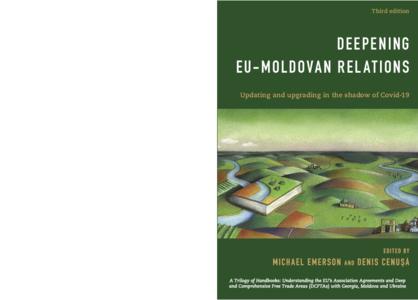
Deepening EU-Moldovan Relations: Updating and upgrading in the shadow of Covid-19. Third edition.
This Handbook, now in its third edition, represents the most comprehensive and independent assessment of the Association Agreement and Deep and…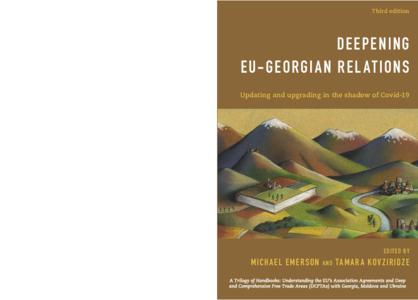
Deepening EU-Georgian Relations: Updating and upgrading in the shadow of Covid-19. Third edition.
This Handbook, now in its third edition, represents the most comprehensive and independent assessment of the Association Agreement and Deep and Comprehensive Free Trade Area (DCFTA) between the EU and Georgia. It is one of a Trilogy of…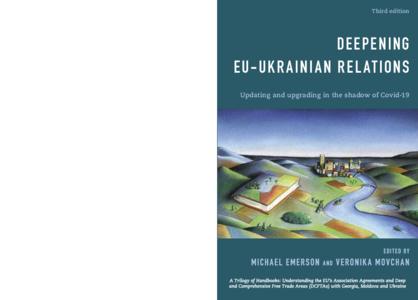
Deepening EU-Ukrainian Relations: Updating and upgrading in the shadow of Covid-19. Third edition.
This Handbook, now in its third edition, represents the most comprehensive and independent assessment of the Association Agreement and Deep and Comprehensive Free Trade Area (DCFTA) between the EU and Ukraine. It is one of a Trilogy of…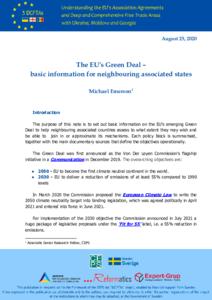
The EU’s Green Deal – basic information for neighbouring associated states
Introduction The purpose of this note is to set out basic information on the EU’s emerging Green Deal to help neighbouring associated countries assess to what extent…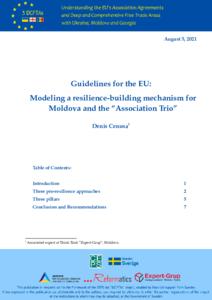
Guidelines for the EU: Modeling a resilience-building mechanism for Moldova and the “Association Trio”
The current policy brief attempts to present a set of guidelines (“mechanisms”) that can facilitate the injection of the resilience logic into the actions of the EU towards one of the Eastern Partnership countries - Moldova. This policy…
The Struggle for Good Governance in Eastern Europe
At a time when many regions of the world, Europe included, see a resurgence of authoritarianism, several countries in Eastern Europe: Ukraine, Moldova, Georgia and Armenia, are struggling to counter this trend by developing European-style democracies. In…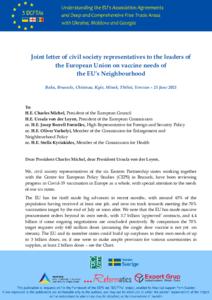
Joint letter of civil society representatives to the leaders of the EU on vaccine needs of the EU’s Neighbourhood
Joint letter of civil society representatives to the leaders of the European Union on vaccine needs of the EU’s Neighbourhood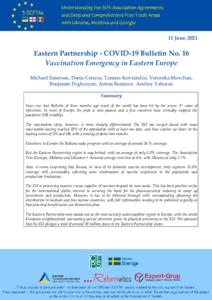
EaP Bulletin No 16: Vaccination Emergency in Eastern Europe
Covid-19 vaccines contracted and administered by the EU
With Russia threatening Ukraine with war, what should the EU do?
Russia’s threat of war with Ukraine, whether for real, for show, or for some undetermined mix of the two, demands a powerful response. While the military-strategic aspect has to be left to the US/NATO, the EU can respond on the basis of its own…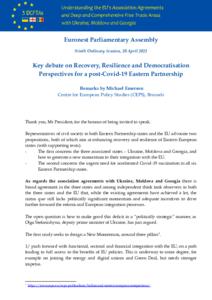
Remarks by Michael Emerson at the Ninth Ordinary Session of the Euronest Parliamentary Assembly
Euronest Parliamentary Assembly Ninth Ordinary Session, 20 April 2021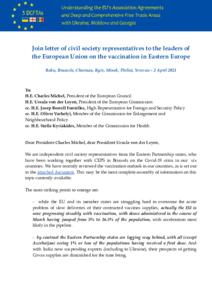
Joint letter of civil society representatives to the leaders of the EU the vaccination in Eastern Europe
Baku, Brussels, Chisinau, Kyiv, Minsk, Tbilisi, Yerevan – 2 April 2021 To: H.E.…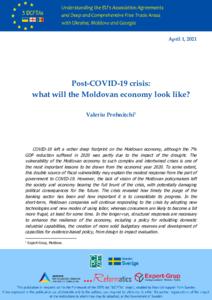
Post-COVID-19 crisis: what will the Moldovan economy look like?
COVID-19 left a rather deep footprint on the Moldovan economy, although the 7% GDP reduction suffered in 2020 was partly due to the impact of the drought. The vulnerability of the Moldovan economy to such complex and intertwined crises…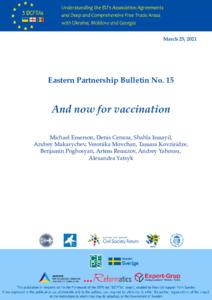
EaP Bulletin No 15: And now for vaccination
While third waves of infections have been continuing in much of Europe, maximum efforts are now being made to assure mass vaccination as the only way to stop the pandemic. Among major…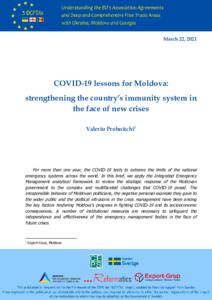
COVID-19 lessons for Moldova: strengthening the country’s immunity system in the face of new crises

Balkan and Eastern European Comparisons: Building a New Momentum for the European integration of the Balkan and Eastern European associated states
CEPS first published in 2018 a comparison of how the Balkan and Eastern European associated states…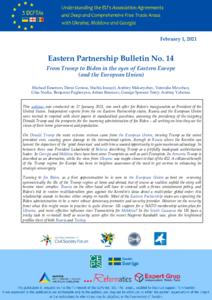
EaP Bulletin No 14: From Trump to Biden in the eyes of Eastern Europe (and the European Union)
This webinar was conducted on 27 January 2021, one week after Joe Biden’s inauguration as President of the United States. Independent experts from the six Eastern…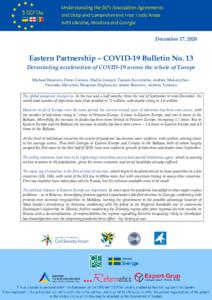
EaP COVID-19 Bulletin No 13: Devastating acceleration of COVID-19 across the whole of Europe
The global pandemic charges on. In the two and a half months, from the end of September to mid-December, the world total number of infections more than doubled to 72 million, with deaths rising to 1.6 million.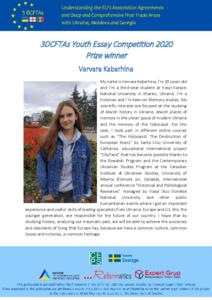
The Culture of Memory of the Second World War: The Common Denominator of Ukraine and Europe
3DCFTAs Youth Essay Competition – Prize winner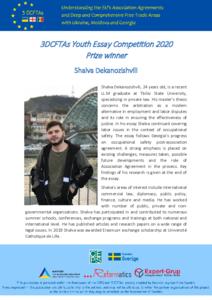
Tracking Georgia’s Occupational Safety Progress Post-Association Agreement: The Good, the Bad and the Uncertain
3DCFTAs Youth Essay Competition – Prize winner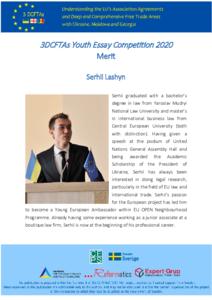
Of Carrots and Sticks: Sustainable Development in EU-Ukraine Association Agreement
3DCFTAs Youth Essay Competition – Merit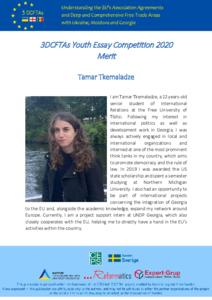
Uncovering Traces of the Association Agreement: Alongside My Route
3DCFTAs Youth Essay Competition – Merit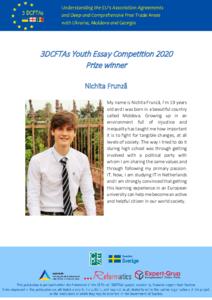
Agriculture: a RM-EU Association Agreement priority in desperate need of change
3DCFTAs Youth Essay Competition – Prize winner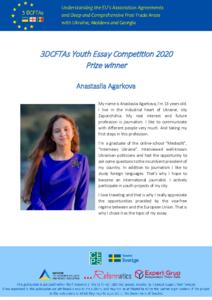
Visa-free regime: a diplomatic gesture or a fateful decision?
3DCFTAs Youth Essay Competition – Prize winner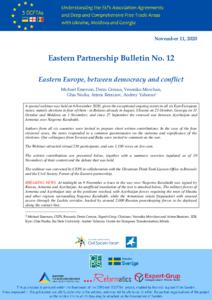
EaP Bulletin No 12: Eastern Europe, between democracy and conflict
A special webinar was held on 6 November 2020, given the exceptional ongoing events in all six East European states, namely elections in four of them - in Belarus already in August, Ukraine on 25 October,…
Beyond Frozen Conflict: Scenarios for the Separatist Disputes of Eastern Europe
The renewed war between Azerbaijan and Armenia over Nagorno Karabakh makes this publication on all of the unresolved conflicts of the post-Soviet space uniquely valuable background reading. The chapter on Nagorno Karabakh…
How Black Sea offshore wind power can deliver a green deal for this EU region
An EU low-carbon economy, with a fully decarbonised power sector at its core, will require very large volumes of low-carbon electricity. To date, offshore wind holds the most promise for the necessary volumes to be realised. While the North Sea offers…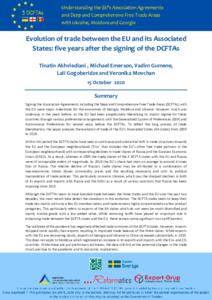
Evolution of trade between the EU and its Associated States: five years after the signing of the DCFTAs
Signing the Association Agreements including the Deep and Comprehensive Free Trade Areas (DCFTAs) with the EU were major milestones for the economies of Georgia, Moldova and Ukraine. However, much was underway in the years before, as the EU had been…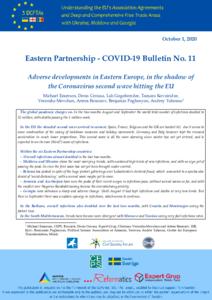
EaP COVID-19 Bulletin No 11: Adverse developments in Eastern Europe, in the shadow of the Coronavirus second wave hitting the EU
The global pandemic charges on. In the two months August and September the world total number of infections doubled to 32 million, with deaths passing the 1 million mark. In…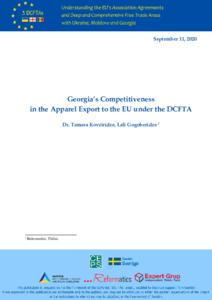
Georgia’s Competitiveness in the Apparel Export to the EU under the DCFTA
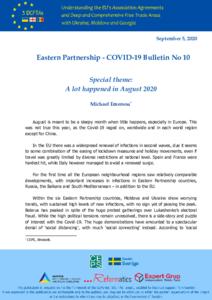
EaP COVID-19 Bulletin No 10: A lot happened in August 2020
August is meant to be a sleepy month when little happens, especially in Europe. This was not true this year, as the Covid-19 raged on, worldwide and in each world region except for…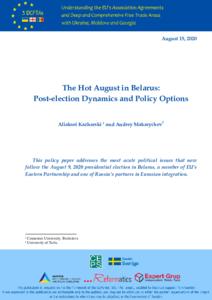
The Hot August in Belarus: Post-election Dynamics and Policy Options
This policy paper addresses the most acute political issues that now follow the August 9, 2020 presidential election in Belarus, a member of EU’s Eastern Partnership and one of Russia’s partners in Eurasian integration.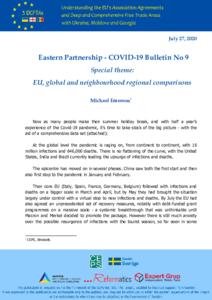
EaP COVID-19 Bulletin No 9: EU, global and neighbourhood regional comparisons
Now as many people make their summer holiday break, and with half a year’s experience of the Covid-19 pandemic, it’s time to take stock of the big picture - with the aid of a…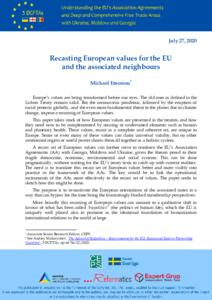
Recasting European values for the EU and the associated neighbours
Europe’s values are being transformed before our…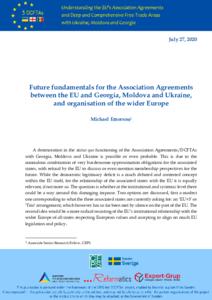
Future fundamentals for the Association Agreements between the EU and Georgia, Moldova and Ukraine, and organisation of the wider Europe
A deterioration in the status quo functioning of the Association Agreements/DCFTAs with Georgia, Moldova and Ukraine is possible or even probable. This is due to the anomalous combination of very burdensome approximation obligations for the…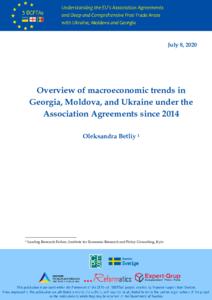
Overview of macroeconomic trends in Georgia, Moldova, and Ukraine under the Association Agreements since 2014
The year 2020 has brought enormous challenges for the entire world. The COVID-19 triggered the global economic crisis with risks of high unemployment, a decline in real disposable income, and the need to find fiscal space to finance increased…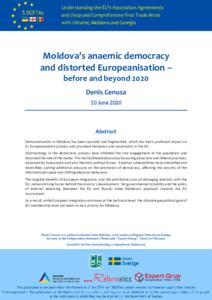
Moldova’s anaemic democracy and distorted Europeanisation – before and beyond 2020
Democratisation in Moldova has been sporadic and fragmented, which has had a profound impact on its Europeanisation process and provoked hesitation and uncertainty in the EU. Shortcomings…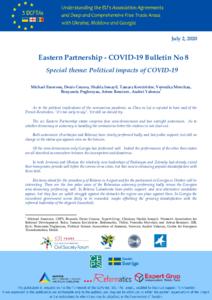
EaP COVID-19 Bulletin No 8: Political impacts of COVID-19
As to the political implications of the coronavirus pandemic, as Chou en Lai is reputed to have said of the French Revolution, “it’s too early to say”. Yet still we should try. The…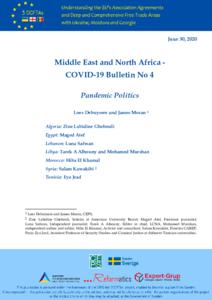
MENA COVID-19 Bulletin No 4: Pandemic Politics
The past two weeks saw a surge in infection rates in Algeria, Morocco and Libya, while the situation continues to be worrisome in Egypt. As in Europe, fears for new outbreaks or waves are widespread in the EU’s Southern Neighbourhood, especially now…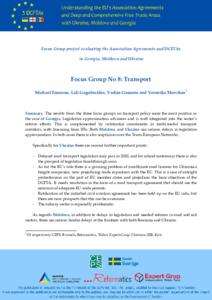
Focus Group No.8 – Transport
The results from the three focus groups on transport policy were the most positive in the case of Georgia. Legislative approximation advances and is well integrated into the sector’s reform efforts. This is…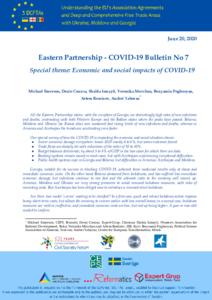
EaP COVID-19 Bulletin No 7: Economic and social impacts
All the Eastern Partnership states, with the exception of Georgia, see disturbingly high rates of new infections and deaths, contrasting with both Western Europe and the Balkan states where the peaks have passed. Belarus, Moldova and…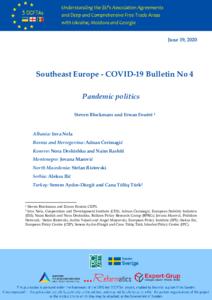
Southeast Europe COVID-19 Bulletin No 4: Pandemic Politics
In this 4th and final Bulletin before the summer, we focus on the latest developments with regard to the Covid-19 pandemic in the region, and the impact it has had on the overall political environment within each country, many of whom are…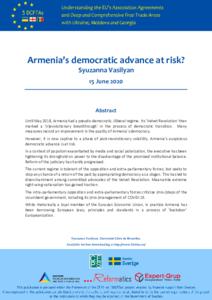
Armenia’s democratic advance at risk?
Until May 2018, Armenia had a pseudo-democratic, illiberal regime. Its ‘Velvet Revolution’ then marked a ‘(r)evolutionary breakthrough’ in the process of democratic transition. Many measures record an improvement in the quality of Armenia’s democracy.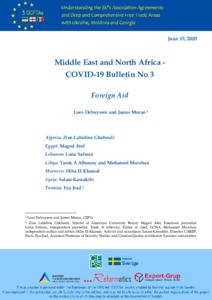
MENA COVID-19 Bulletin No 3: Foreign Aid
In this third bulletin, we provide an update on the latest developments in the rates of infection and mortality in the region, the general easing of restrictions, as well as the range and extent of international assistance. Overall,…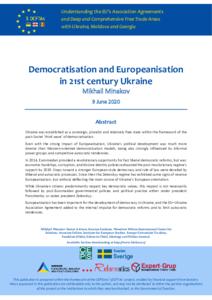
Democratisation and Europeanisation in 21st century Ukraine
Ukraine was established as a sovereign, pluralist and relatively free state within the framework of the post-Soviet ‘third wave’ of democratisation. Even with the strong impact of Europeanisation,…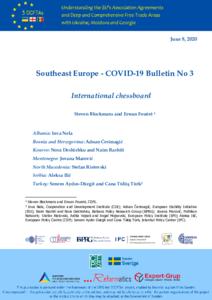
Southeast Europe COVID-19 Bulletin No 3: International Chessboard
In this third bulletin, we provide an update on the latest developments on the rates of infection and mortality arising out of the pandemic in the region, the general easing of restrictions, as well as the range and extent of international assistance. As…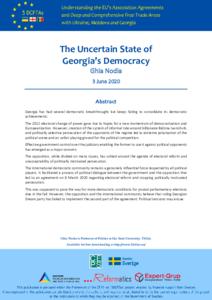
The Uncertain State of Georgia’s Democracy
Georgia has had several democratic breakthroughs but keeps failing to consolidate its democratic achievements. The 2012 electoral change of power gave rise to hopes for a new momentum of democratization and Europeanization. However, creation…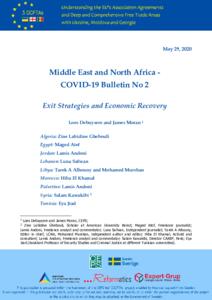
MENA COVID-19 Bulletin No 2: Exit Strategies and Economic Recovery
In this second bulletin, we review the latest data on the Covid–19 pandemic in the Middle East and North Africa, the general easing of restrictions, the economic impact so far and recovery measures. As most EU member states are gradually…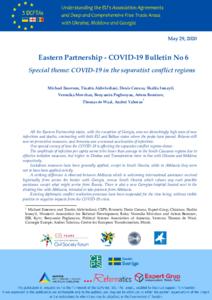
COVID-19 Bulletin No 6: COVID-19 in the Separatist Conflict Regions
All the Eastern Partnership states, with the exception of Georgia, now see disturbingly high rates of new infections and deaths, contrasting with both EU and Balkan states where the peaks have passed. Belarus still sees no preventive…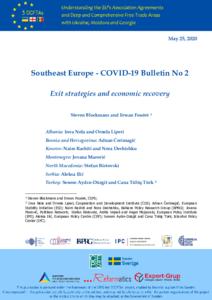
Southeast Europe COVID-19 Bulletin No 2: Exit Strategies and Economic Recovery
In this second bulletin, we review the latest data on the Covid–19 pandemic in the Western Balkans and Turkey, the general easing of restrictions, the economic impact so far and recovery measures.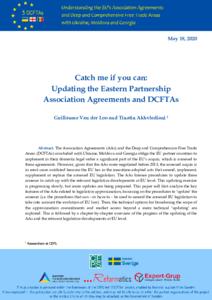
Catch me if you can: Updating the Eastern Partnership Association Agreements and DCFTAs
The Association Agreements (AAs) and the Deep and Comprehensive Free Trade Areas (DCFTAs) concluded with Ukraine, Moldova and Georgia oblige the EU partner countries to implement in their domestic legal order a significant part of the…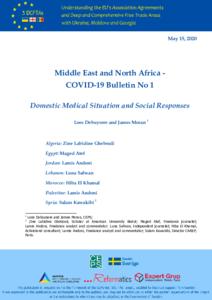
MENA COVID-19 Bulletin No 1: Domestic Medical Situation and Social Responses
While Europe swiftly became one of the epicenters of the Covid-19 pandemic, the EU's Southern Neighbourhood has so far been less affected. The largest number of infections and deaths have been counted in Egypt, Morocco and Algeria,…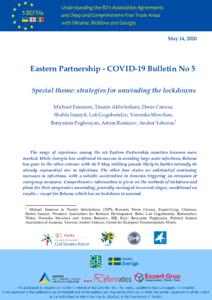
COVID-19 Bulletin No 5: Strategies for Unwinding the Lockdowns
The range of experience among the six Eastern Partnership countries becomes more marked. While Georgia has confirmed its success in avoiding large scale infections, Belarus has…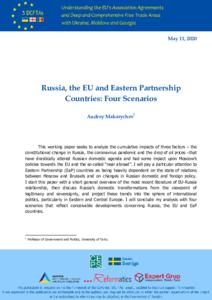
Russia, the EU and Eastern Partnership Countries: Four Scenarios
This working paper seeks to analyze the cumulative impacts of three factors – the constitutional change in Russia, the coronavirus pandemic and the drop of oil prices –that have…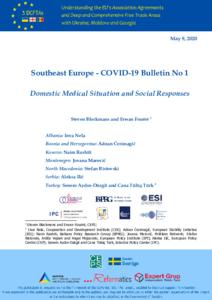
Southeast Europe COVID-19 Bulletin No 1: Domestic Medical Situation and Social Responses
While the European Union has become the epicentre of the global Covid-19 crisis, the countries of the Western Balkans – Albania, Bosnia and Herzegovina, Kosovo, Montenegro, North…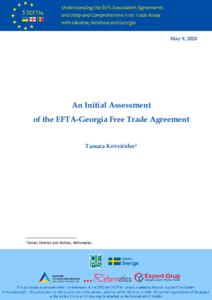
An Initial Assessment of the EFTA-Georgia Free Trade Agreement
IntroductionThe Free Trade Agreement between Georgia and the European Free Trade Area (EFTA) counts roughly two years of implementation – not a long period of time to substantially change either trade…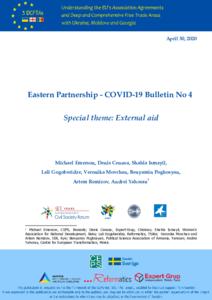
COVID-19 Bulletin No 4: External Aid
This edition of the Bulletin is dedicated to external aid provided to the Eastern Partnership six. From the notes supplied by the country experts, the following points…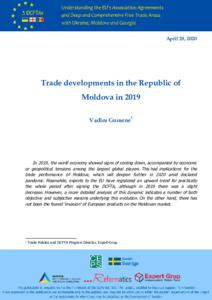
Trade developments in the Republic of Moldova in 2019
In 2019, the world economy showed signs of cooling down, accompanied by economic or geopolitical tensions among the largest global players. This had implications for the trade…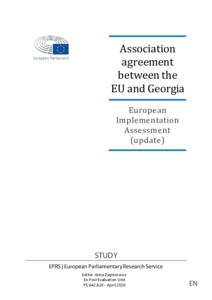
Association agreement between the EU and Georgia: European Implementation Assessment (update)
In November 2019, the European Parliament's Committee on Foreign Affairs (AFET) requested to draw up an own-initiative annual report on the implementation of the association agreement between the EU and Georgia (2019/2200(INI)).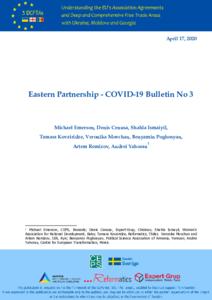
COVID-19 Bulletin No 3
We have now established a team from the six Eastern Partnership states and the EU to monitor the evolution of the COVID-19 crisis. In this Bulletin we present comparative summaries…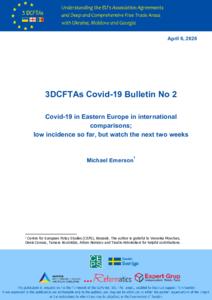
COVID-19 Bulletin No 2
This Bulletin presents the basic data for infections and deaths from the Covid-19 for the six Eastern Partnership (EaP) states in the international context, based mainly on the data base maintained in real time at…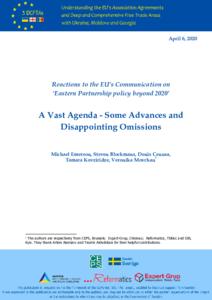
Reactions to the EU’s Communication on ‘Eastern Partnership policy beyond 2020’: A Vast Agenda - Some Advances and Disappointing Omissions
This detailed, 18-page Communication is intended to set the agenda for the Eastern Partnership (EaP) Summit on 18 June 2020, which in turn should decide jointly agreed orientations of the EU and the partner states for EaP…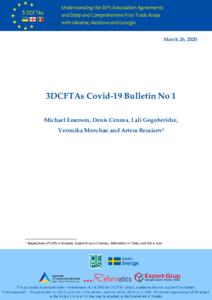
COVID-19 Bulletin No 1
While the EU has become the epicentre of the global Covid-19 crisis, the three AA states – Georgia, Moldova and Ukraine – have so far remained remarkably lightly affected. This is in spite of the fact that all three countries have large…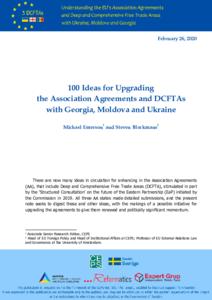
100 Ideas for Upgrading the Association Agreements and DCFTAs with Georgia, Moldova and Ukraine
There are now many ideas in circulation for enhancing in the Association Agreements (AA), that include Deep and Comprehensive Free Trade Areas (DCFTA), stimulated in part by the ‘Structured Consultation’ on the future of the Eastern Partnership…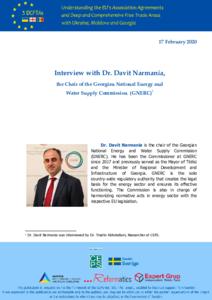
Interview with the Chair of the Georgian National Energy and Water Supply Commission (GNERC)
Dr. Davit Narmania is the chair of the Georgian National Energy and Water Supply Commission (GNERC). He has been the Commissioner at GNERC since…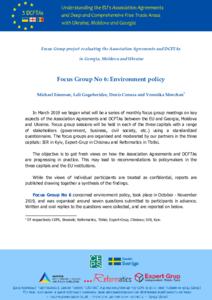
Focus Group No.6 – Environment policy
In March 2019 we began what will be a series of monthly focus group meetings on key aspects of the Association Agreements and DCFTAs between the EU and Georgia, Moldova and Ukraine. Focus group sessions will be held in each of the three…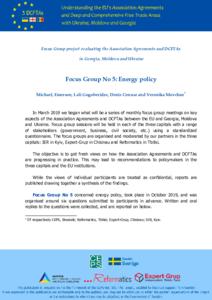
Focus Group No. 5 – Energy policy
In March 2019 we began what will be a series of monthly focus group meetings on key aspects of the Association Agreements and DCFTAs between the EU and Georgia, Moldova and Ukraine. Focus group sessions will be held in each of the…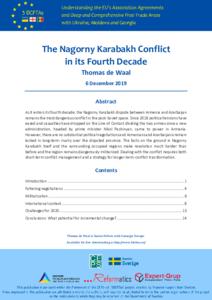
The Nagorny Karabakh Conflict in its Fourth Decade
As it enters its fourth decade, the Nagorny Karabakh dispute between Armenia and Azerbaijan remains the most dangerous conflict in the post-Soviet space. Since 2018 political tensions have eased and casualties have dropped on the Line of…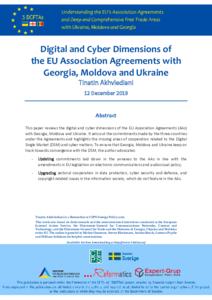
Digital and Cyber Dimensions of the EU Association Agreements with Georgia, Moldova and Ukraine
This paper reviews the digital and cyber dimensions of the EU Association Agreements (AAs) with Georgia, Moldova and Ukraine. It sets out the commitments made by the three countries under the Agreements and highlights the missing areas of cooperation…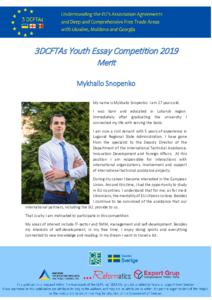
The little story about big changes on the road to the dream
3DCFTAs Youth Essay Competition – Merit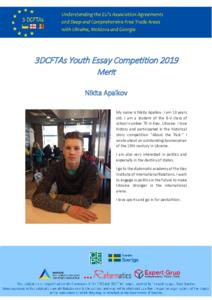
Agreement of Ukraine and the EU: What it means for me - Ukrainian
3DCFTAs Youth Essay Competition – Merit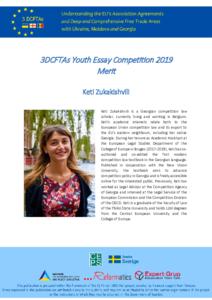
The Prospects of Competition Cooperation through the Prism of the EU-Georgia Association Agreement - Strength is in Unity
3DCFTAs Youth Essay Competition – Merit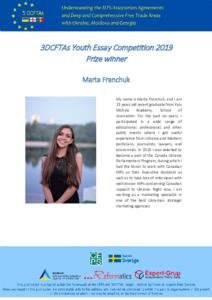
Can you believe that?
3DCFTAs Youth Essay Competition – Prize winner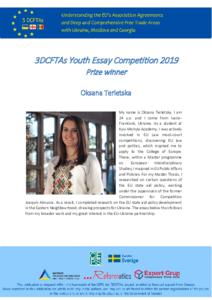
State aid policy under the EU-Ukraine Association Agreement: Promising fruits from a terra incognita
3DCFTAs Youth Essay Competition – Prize winner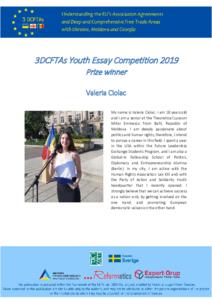
RM-EU Association Agreement: A powerful anti-corruption tool in a society that started to awake
3DCFTAs Youth Essay Competition – Prize winner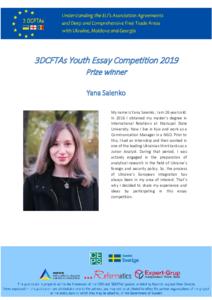
How can we reach the stars?
3DCFTAs Youth Essay Competition – Prize winner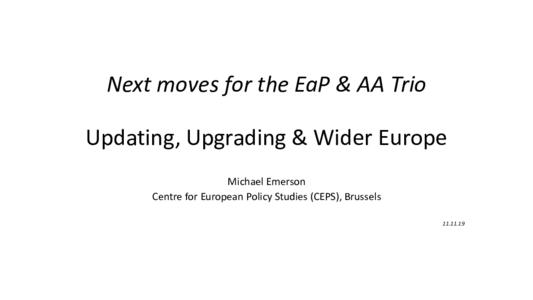
Next moves for the EaP & AA Trio: Updating, Upgrading & Wider Europe
The presentation of Michael Emerson at the 3rd Association Exchange Forum (Kyiv, November 14, 2019).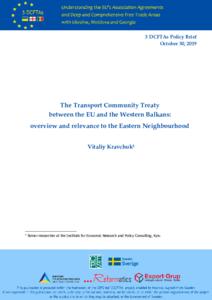
The Transport Community Treaty between the EU and the Western Balkans: overview and relevance to the Eastern Neighbourhood
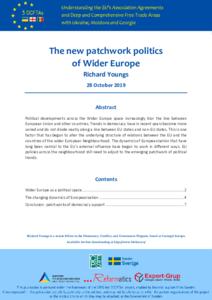
The new patchwork politics of Wider Europe
Political developments across the Wider Europe space increasingly blur the line between European Union and other countries. Trends in democracy have in recent years become more varied and do not divide neatly along a line between EU states and non-EU…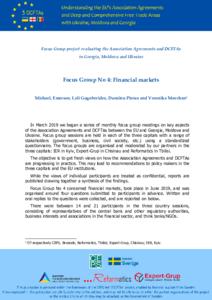
Focus Group No. 4 - Financial markets
In March 2019 we began a series of monthly focus group meetings on key aspects of the Association Agreements and DCFTAs between the EU and Georgia, Moldova and Ukraine. Focus group sessions are held in each of the three capitals with a range of stakeholders…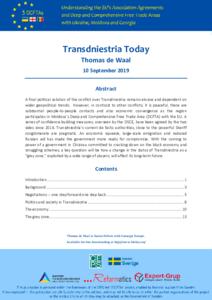
Transdniestria Today
A final political solution of the conflict over Transdniestria remains elusive and dependent on wider geopolitical trends. However, in contrast to other conflicts, it is peaceful, there are substantial people-to-people contacts and also economic convergence…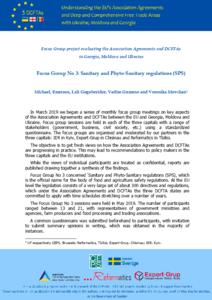
Focus Group No. 3 - Sanitary and Phyto-Sanitary regulations (SPS)
In March 2019 we began a series of monthly focus group meetings on key aspects of the Association Agreements and DCFTAs between the EU and Georgia, Moldova and Ukraine. Focus group sessions are held in each of the three capitals with a range of stakeholders…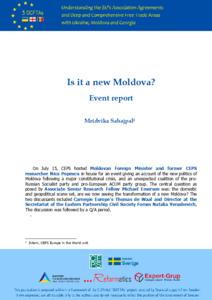
Is it a new Moldova? Event report
Mridvika Sahajpal On July 15, CEPS hosted Moldovan Foreign Minister and former CEPS researcher Nicu Popescu in house for an event giving an account of the new politics of Moldova following a major constitutional crisis, and an unexpected coalition…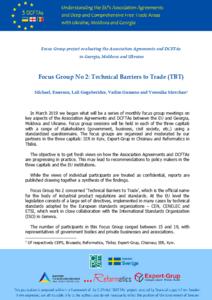
Focus Group No. 2 – Technical Barriers to Trade (TBT)
In March 2019 we began what will be a series of monthly focus group meetings on key aspects of the Association Agreements and DCFTAs between the EU and Georgia, Moldova and Ukraine. Focus group sessions will be held in each of the three capitals with…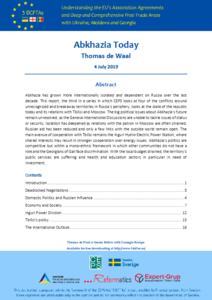
Abkhazia Today
Abkhazia has grown more internationally isolated and dependent on Russia over the last decade. This report, the third in a series in which CEPS looks at four of the conflicts around unrecognized and breakaway territories in Russia’s periphery, looks…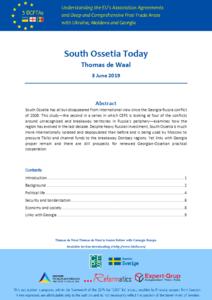
South Ossetia Today
South Ossetia has all but disappeared from international view since the Georgia-Russia conflict of 2008. This study—the second in a series in which CEPS is looking at four of the conflicts around unrecognized and breakaway territories in Russia’s periphery—examines…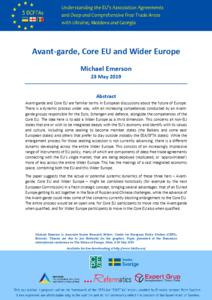
Avant-garde, Core EU and Wider Europe
Avant-garde and Core EU are familiar terms in European discussions about the future of Europe. There is a dynamic process under way, with an increasing competences conducted by an Avant-garde groups responsible for the Euro, Schengen and defence, alongside…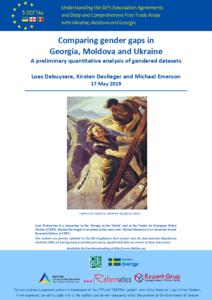
Comparing gender gaps in Georgia, Moldova and Ukraine. A preliminary quantitative analysis of gendered datasets
This paper investigates different types of gender gaps that exist in the perceptions and participation of Moldovan, Georgian and Ukrainian citizens in the political, social and economic realms. The aim of this preliminary study is to not only analyse…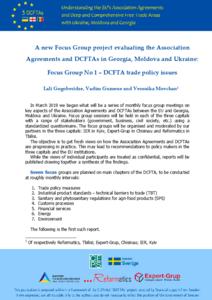
Focus Group No. 1 – DCFTA trade policy issues
In March 2019 we began what will be a series of monthly focus group meetings on key aspects of the Association Agreements and DCFTAs between the EU and Georgia, Moldova and Ukraine. Focus group sessions will be held in each of the three capitals with…
Findings of mass media monitoring in Armenia: Detecting propaganda (second monitoring)
Analytical Center for Globalization and Regional Cooperation (ACGRC) during October‐December 2018 within the scope of Second Cycle: Measuring the public views regarding International organizations and Monitoring of Media in Armenia…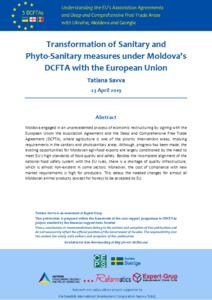
Transformation of Sanitary and Phyto-Sanitary measures under Moldova’s DCFTA with the European Union
Moldova engaged in an unprecedented process of economic restructuring by signing with the European Union the Association Agreement and the Deep and Comprehensive Free Trade Agreement (DCFTA), where agriculture is one of the priority intervention areas,…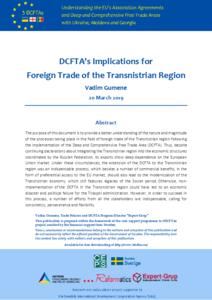
DCFTA’s Implications for Foreign Trade of the Transnistrian Region
The purpose of this document is to provide a better understanding of the nature and magnitude of the processes taking place in the field of foreign trade of the Transnistrian region following the implementation of the Deep and Comprehensive Free Trade…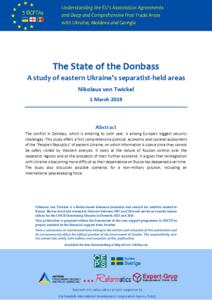
The State of the Donbass: A Study of Eastern Ukraine’s Separatist-held Areas
The conflict in Donbass, which is entering its sixth year, is among Europe's biggest security challenges. This study offers a first comprehensive political, economic and societal assessment of the "People's Republics" of eastern Ukraine, on which information…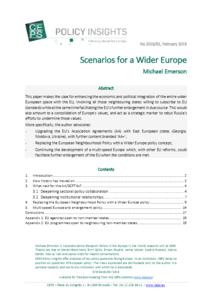
Scenarios for a Wider Europe
This paper makes the case for enhancing the economic and political integration of the entire wider European space with the EU, involving all those neighbouring states willing to subscribe to EU standards while at the same time facilitating the EU’s…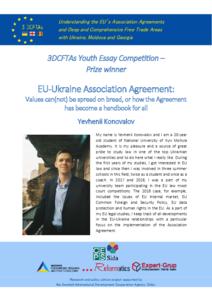
EU-Ukraine Association Agreement: Values can(not) be spread on bread, or how the Agreement has become a handbook for all
3DCFTAs Youth Essay Competition – Prize winner.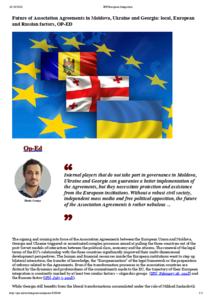
Future of Association Agreements in Moldova, Ukraine and Georgia: local, European and Russian factors
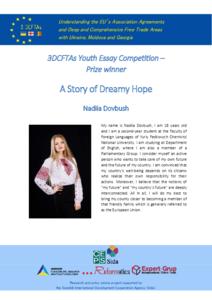
A Story of Dreamy Hope
3DCFTAs Youth Essay Competition – Prize winner.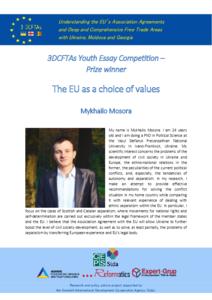
The EU as a choice of values
3DCFTAs Youth Essay Competition – Prize winner.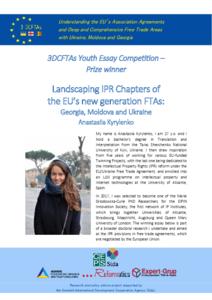
Landscaping IPR Chapters of the EU’s new generation FTAs: Georgia, Moldova and Ukraine
3DCFTAs Youth Essay Competition – Prize winner.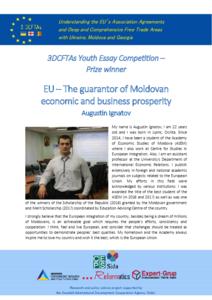
EU – The guarantor of Moldovan economic and business prosperity
3DCFTAs Youth Essay Competition – Prize winner.Tracking the EU-Georgia Association Agreement Harmonization Progress in the Waste Management Sector
3DCFTAs Youth Essay Competition – Prize winner. The following essay examines the progress of the Republic of Georgia in the application of the EU Directives on Waste Management under the EU-Georgia Association Agreement. The…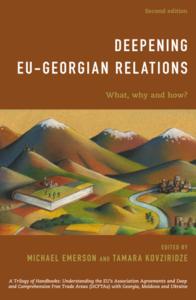
Deepening EU-Georgian Relations: What, why and how? Second edition
This Handbook, now in its second edition, represents the most comprehensive and independent assessment of the Association Agreement and Deep and Comprehensive Free Trade Area (DCFTA) between the EU and Georgia. It is one of a Trilogy of Handbooks,…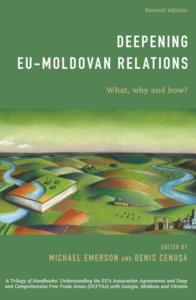
Deepening EU-Moldovan Relations: What, why and how? Second edition
This Handbook, now in its second edition, represents the most comprehensive and independent assessment of the Association Agreement and Deep and Comprehensive Free Trade Area (DCFTA) between the Moldova. It is one of a Trilogy of Handbooks,…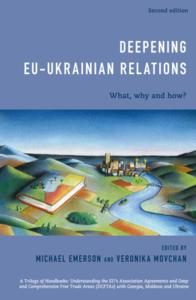
Deepening EU-Ukrainian Relations: What, why and how? Second edition
This Handbook, now in its second edition, represents the most comprehensive and independent assessment of the Association Agreement and Deep and Comprehensive Free Trade Area (DCFTA) between the EU and Ukraine. It is one of a Trilogy of Handbooks,…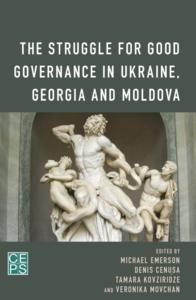
The Struggle for Good Governance in Eastern Europe
This book contains the first comprehensive and independent comparative assessment of the fundamental political challenges facing Georgia,…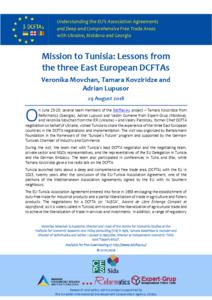
Mission to Tunisia: Lessons from the three East European DCFTAs
On June 25-29, several team members of the 3dcftas.eu project – Tamara Kovziridze from Reformatics (Georgia), Adrian Lupusor and Vadim Gumene from Expert-Grup (Moldova), and Veronika Movchan from the IER (Ukraine) – and Valery Piatnitsky, former Chief…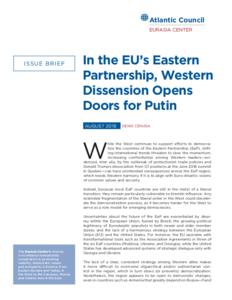
In the EU’s Eastern Partnership, Western Dissension Opens Doors for Putin
While the West continues to support efforts to democratize the countries of the Eastern Partnership (EaP), shifting international trends threaten to slow the momentum. Increasing confrontation among Western leaders—evidenced, inter alia, by the outbreak…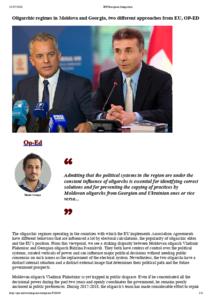
Oligarchic regimes in Moldova and Georgia, two different approaches from EU
Admitting that the political systems in the region are under the constant influence of oligarchs is essential for identifying correct solutions and for preventing the copying of practices by Moldovan oligarchs from Georgian and Ukrainian ones or vice…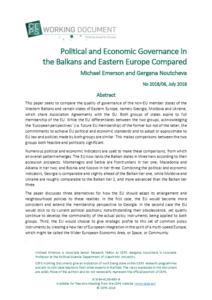
Political and Economic Governance in the Balkans and Eastern Europe Compared
The not-yet EU member states of the Balkans and three states of Eastern Europe – Georgia, Moldova and Ukraine – have much in common: geographic proximity to the EU, political priority to become members of the EU, and similar struggles to improve their…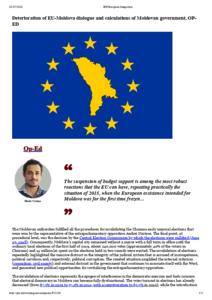
Deterioration of EU-Moldova dialogue and calculations of Moldovan government
The suspension of budget support is among the most robust reactions that the EU can have, repeating practically the situation of 2015, when the European assistance intended for Moldova was for the first time frozen...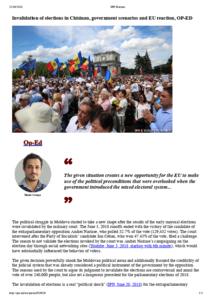
Invalidation of elections in Chisinau, government scenarios and EU reaction
The given situation creates a new opportunity for the EU to make use of the political preconditions that were overlooked when the government introduced the mixed electoral system...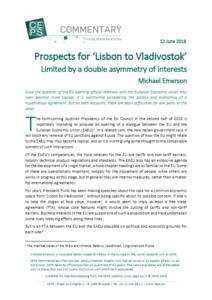
Prospects for ‘Lisbon to Vladivostok’: Limited by a double asymmetry of interests
Since the question of the EU opening official relations with the Eurasian Economic Union may soon become more topical, it is worthwhile considering the politics and economics of a hypothetical agreement. But on both accounts, there are basic difficulties…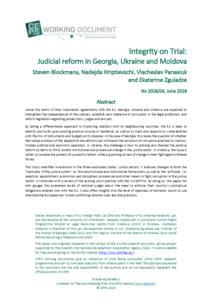
Integrity on Trial: Judicial reform in Georgia, Ukraine and Moldova
Under the terms of their Association Agreements with the EU, Georgia, Ukraine and Moldova are expected to strengthen the independence of the judiciary, establish zero tolerance of corruption in the legal profession, and reform legislation regarding…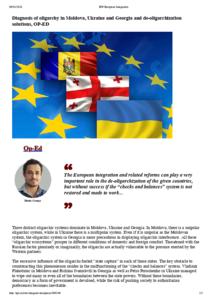
Diagnosis of oligarchy in Moldova, Ukraine and Georgia and de-oligarchization solutions
The European integration and related reforms can play a very important role in the de-oligarchization of the given countries, but without success if the “checks and balances” system is not restored and made to work...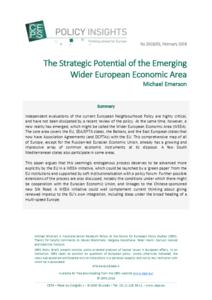
The Strategic Potential of the Emerging Wider European Economic Area
Independent evaluations of the current European Neighbourhood Policy are highly critical, and have not been dissipated by a recent review of the policy. At the same time, however, a new reality has emerged, which might be called the Wider European…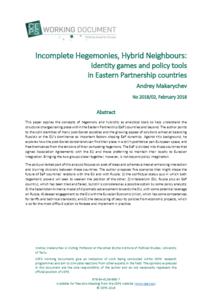
Incomplete Hegemonies, Hybrid Neighbours: Identity games and policy tools in Eastern Partnership countries
This paper applies the concepts of hegemony and hybridity as analytical tools to help understand the structural changes taking place within the Eastern Partnership (EaP) countries and beyond. The author points to the split identities of many post-Soviet…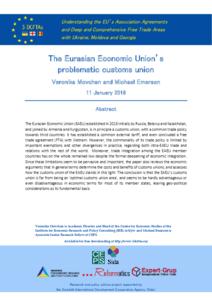
The Eurasian Economic Union’s problematic customs union
The Eurasian Economic Union (EAEU) established in 2015 initially by Russia, Belarus and Kazakhstan, and joined by Armenia and Kyrgyzstan, is in principle a customs union, with a common trade policy towards third countries. It has established…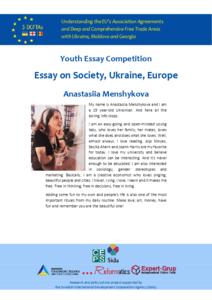
Essay on Society, Ukraine, Europe
3DCFTAs Youth Essay Competition – Prize winner.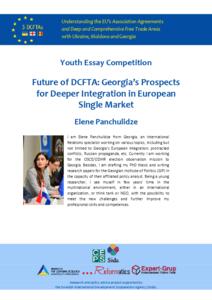
Future of DCFTA: Georgia’s Prospects for Deeper Integration in European Single Market
3DCFTAs Youth Essay Competition – Prize winner. Executive Summary. The Association Agreement (AA), including its integral component on a Deep and Comprehensive Free Trade Area (DCFTA), between the European Union and…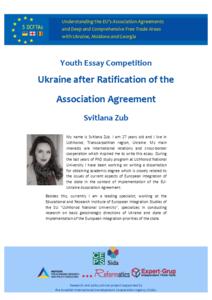
Ukraine after Ratification of the Association Agreement
3DCFTAs Youth Essay Competition – Prize winner.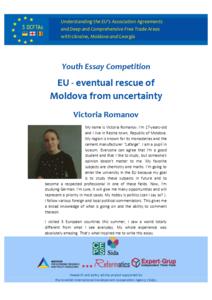
EU - eventual rescue of Moldova from uncertainty
3DCFTAs Youth Essay Competition – Prize winner.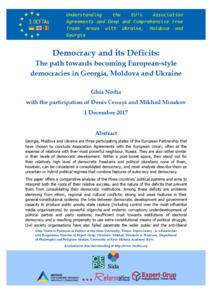
Democracy and Its Deficits: The path towards becoming European-style democracies in Georgia, Moldova and Ukraine
Georgia, Moldova and Ukraine are three participating states of the European Partnership that have chosen to conclude…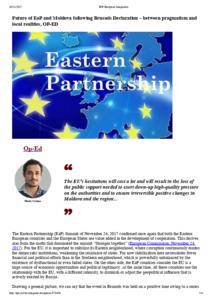
Future of EaP and Moldova following Brussels Declaration – between pragmatism and local realities
"The EU’s hesitations will cost a lot and will result in the loss of the public support needed to exert down-up high-quality pressure on the authorities and to ensure irreversible positive changes in Moldova and the region..."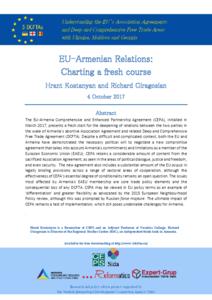
EU-Armenian Relations: Charting a fresh course
The EU-Armenia Comprehensive and Enhanced Partnership Agreement (CEPA), initialled in March 2017, presents a fresh start for the deepening of relations between the two parties in the wake of Armenia’s abortive Association Agreement and related Deep…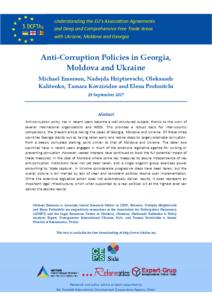
Anti-Corruption Policies in Georgia, Moldova and Ukraine
Anti-corruption policy has in recent years become a well-structured subject, thanks to the work of several international organisations and NGOs. This provides a robust basis for inter-country comparisons, the present article taking the cases of Georgia,…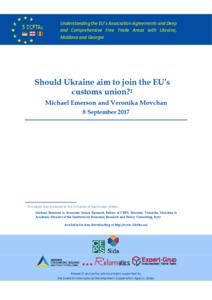
Should Ukraine aim to join the EU’s customs union?
This note takes up the question how possibly to build on Ukraine’s Association Agreement (AA) and Deep and Comprehensive Free Trade Area (DCFTA) with the EU through some fresh initiative to give renewed political and economic momentum to Ukraine’s…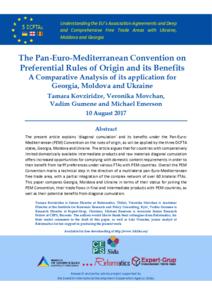
The Pan-Euro-Mediterranean Convention on Preferential Rules of Origin and its Benefits: A Comparative Analysis of its application for Georgia, Moldova and Ukraine
The present article explains ‘diagonal cumulation’ and its benefits under the Pan-Euro-Mediterranean (PEM) Convention on the rules of origin, as will be applied by the three DCFTA states, Georgia, Moldova and Ukraine. The article argues that for countries…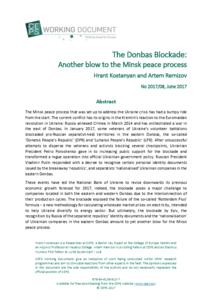
The Donbass Blockade: Another blow to the Minsk peace process
The Minsk peace process that was set up to address the Ukraine crisis has had a bumpy ride from the start. The current conflict has its origins in the Kremlin’s reaction to the Euromaidan revolution in Ukraine: Russia annexed Crimea in March 2014 and…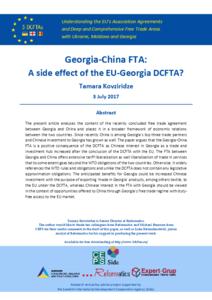
Georgia-China FTA: A side effect of the EU-Georgia DCFTA?
The present article analyses the content of the recently concluded free trade agreement between Georgia and China and places it in a broader framework of economic relations between the two countries. Since recently China is among Georgia’s top three…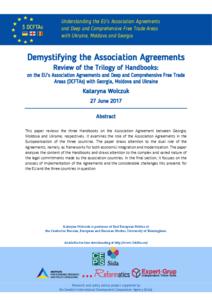
Demystifying the Association Agreement: Review of the Trilogy of Handbooks on the EU’s AA and DCFTAs with Georgia, Moldova and Ukraine
This paper reviews the three Handbooks on the Association Agreement between Georgia, Moldova and Ukraine, respectively. It examines the role of the Association Agreements in the Europeanisation of the three countries. The paper draws attention to the…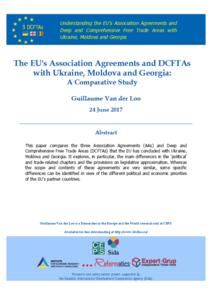
A Comparative study of the Association Agreements and DCFTAs concluded with Ukraine, Moldova and Georgia
This paper compares the three Association Agreements (AAs) and Deep and Comprehensive Free Trade Areas (DCFTAs) that the EU has concluded with Ukraine, Moldova and Georgia. In particular, the main differences in the ‘political’ and trade-related chapters…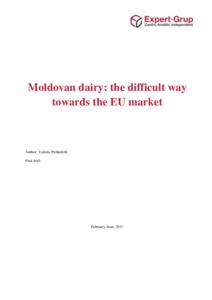
Moldovan dairy: the difficult way towards the EU market
The dairy industry plays an important economic and social role in the Republic of Moldova. By generating an estimated share of 12 percent of the total value-added in the Moldovan food industry, the dairy industry is an economically important sector.…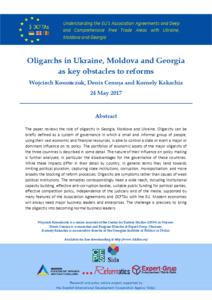
Oligarchs in Ukraine, Moldova and Georgia as key obstacles to reforms
The paper reviews the role of oligarchs in Georgia, Moldova and Ukraine. Oligarchy can be briefly defined as a system of governance in which a small and informal group of people, using their vast economic and financial resources, is able to control…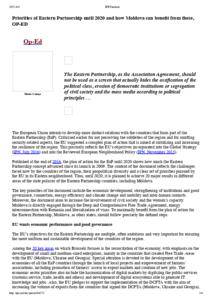
Priorities of Eastern Partnership until 2020 and how Moldova can benefit from these
The Eastern Partnership, as the Association Agreement, should not be used as a screen that actually hides the ossification of the political class, erosion of democratic institutions or segregation of civil society and the mass media according to political…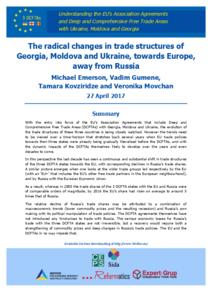
The radical changes in trade structures of Georgia, Moldova and Ukraine, towards Europe, away from Russia
With the entry into force of the EU’s Association Agreements that include Deep and Comprehensive Free Trade Areas (DCFTAs) with Georgia, Moldova and Ukraine, the evolution of the trade structures of these three countries is being closely watched. However…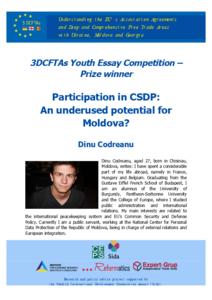
Participation in CSDP: An underused potential for Moldova?
3DCFTAs Youth Essay Competition – Prize winner. This paper looks at to what extent Moldova is involved in CSDP missions? To provide a holistic and targeted answer to this, this paper firstly identifies Moldova’s contribution…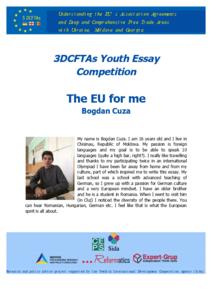
The EU for me
3DCFTAs Youth Essay Competition – Prize winner. What is the European Union exactly? It might seem like a trivial question for some—“surely, we’re educated people, we know that the EU is a political and economic union of 28…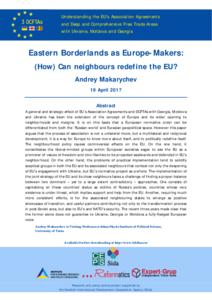
Eastern Borderlands as Europe-Makers: (How) Can neighbours redefine the EU?
A general and strategic effect of EU’s Association Agreements and DCFTAs with Georgia, Moldova and Ukraine has been the extension of the concept of Europe and its wider opening to neighborhoods and margins. It is on this basis that a European normative…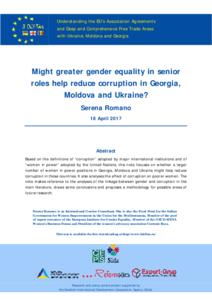
Might greater gender equality in senior roles help reduce corruption in Georgia, Moldova and Ukraine?
Based on the definitions of “corruption” adopted by major international institutions and of “women in power” adopted by the United Nations, this note focuses on whether a larger number of women in power positions in Georgia, Moldova and Ukraine…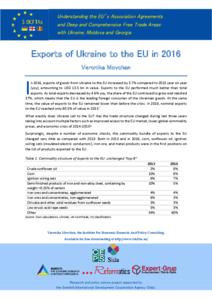
Exports of Ukraine to the EU in 2016
In 2016, exports of goods from Ukraine to the EU increased by 3.7% compared to 2015 year on year (yoy), amounting to USD 13.5 bn in value. Exports to the EU performed much better than total exports. As total exports decreased by 4.6% yoy, the share…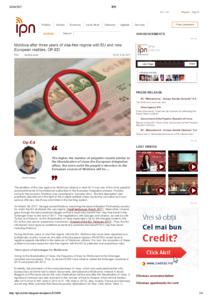
Moldova after three years of visa-free regime with EU and new European realities
The abolition of the visa regime for Moldovan citizens in April 2014 was one of the most palpable accomplishments of the Moldovan authorities in the European integration process. Partially, owing to this success, Moldova was considered a “success story”.…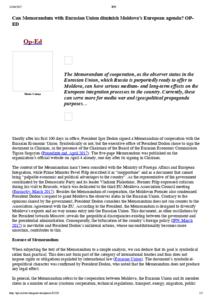
Can Memorandum with Eurasian Union diminish Moldova’s European agenda?
The Memorandum of cooperation, as the observer status in the Eurasian Union, which Russia is purportedly ready to offer to Moldova, can have serious medium- and long-term effects on the European integration processes in the country. Currently, these…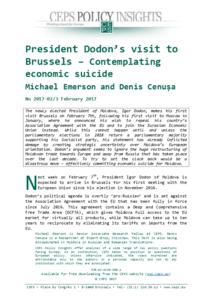
President Dodon’s visit to Brussels – Contemplating economic suicide
The newly elected President of Moldova, Igor Dodon, makes his first visit Brussels on February 7th, following his first visit to Moscow in January, where he announced his wish to repeal his country’s Association Agreement with the EU and to join the…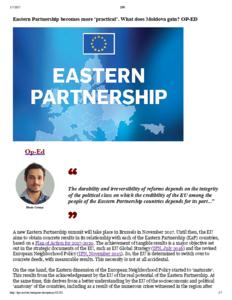
Eastern Partnership becomes more ‘practical’. What does Moldova gain?
A new Eastern Partnership summit will take place in Brussels in November 2017. Until then, the EU aims to obtain concrete results in its relationship with each of the Eastern Partnership (EaP) countries, based on a Plan of Action for 2017-2020. The…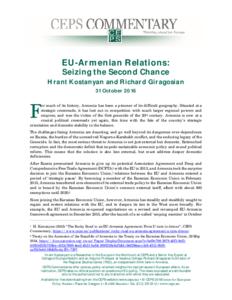
EU-Armenian Relations: Seizing the Second Chance
For much of its history, Armenia has been a prisoner of its difficult geography. Situated at a strategic crossroads, it has lost out in competition with much larger regional powers and empires, and was the victim of the first genocide of the 20th century.…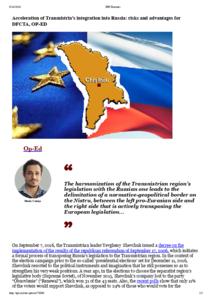
Acceleration of Transnistria’s integration into Russia: risks and advantages for DFCTA
"The harmonization of the Transnistrian region’s legislation with the Russian one leads to the delimitation of a normative-geopolitical border on the Nistru, between the left pro-Eurasian side and the right side that is actively transposing the European…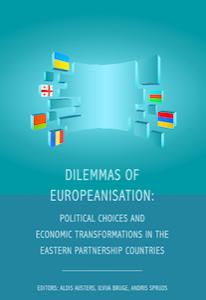
Dilemmas of Europeanisation: Political Choices and Economic Transformations in the Eastern Partnership Countires
Editors: Aldis Austers, Ilvija Bruge, Andris Spruds. This book provides theoretical and practical insights of the Europeanisationn transformations taking place in the Eastern Partnership countries and discusses how the economic ties…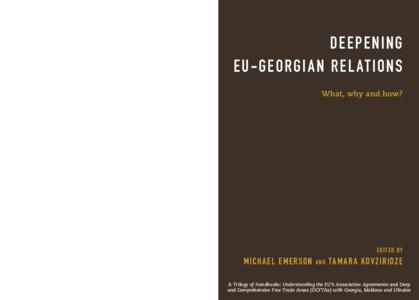
Deepening EU-Georgian Relations: What, why and how?
The signing of the Association Agreement and DCFTA between Georgia and the European Union in 2014 was a strategic political act to deepen the realisation of Georgia’s ‘European choice’. Of all the EU’s eastern neighbours, Georgia has distinguished…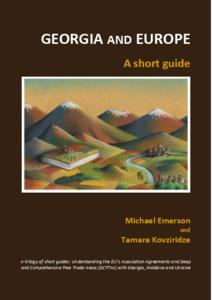
Georgia and Europe – A short guide
The new relationship between Georgia and the European Union is the focus of this accessible, non-technical short guide. This relationship is based on a complex treaty: an Association Agreement with extensive political, economic and legal content, signed…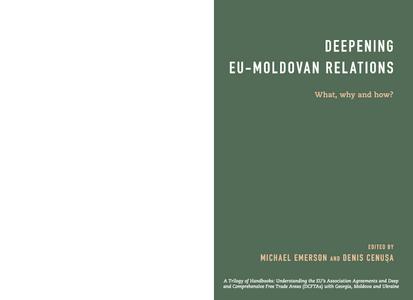
Deepening EU-Moldovan Relations: What, why and how?
The signing of the Association Agreement and DCFTA between Moldova and the European Union in 2014 was a strategic political act to deepen the realisation of Moldova’s ‘European choice’. Of all the EU’s eastern neighbours, Moldova is objectively the…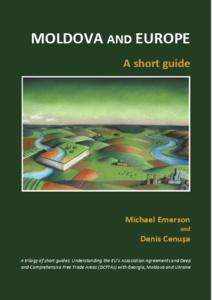
Moldova and Europe – A short guide
The new relationship between Moldova and the European Union is the focus of this accessible, non-technical short guide. This relationship is based on a complex treaty: an Association Agreement with extensive political, economic and legal content, signed…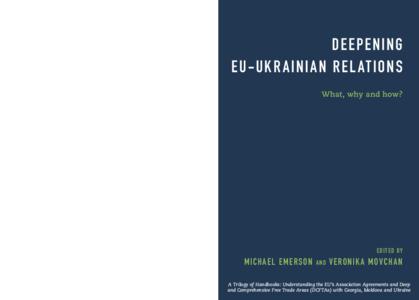
Deepening EU-Ukrainian Relations: What, why and how?
The signing of the Association Agreement and DCFTA between Ukraine and the European Union in 2014 was an act of strategic, geopolitical significance in the history of Ukraine. Emblematic of a struggle to replace the Yanukovich regime at home and to…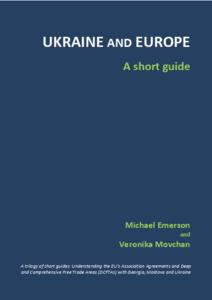
Ukraine and Europe – A short guide
The new relationship between Ukraine and the European Union is the focus of this accessible, non-technical short guide. This relationship is based on a complex treaty: an Association Agreement with extensive political, economic and legal content, signed…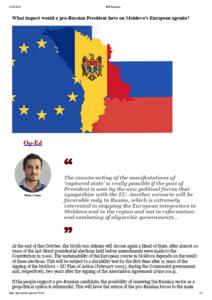
What impact would a pro-Russian President have on Moldova’s European agenda?
The counteracting of the manifestations of ‘captured state’ is really possible if the post of President is won by the new political forces that sympathize with the EU. Another scenario will be favorable only to Russia, which is extremely interested…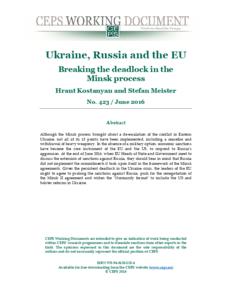
Ukraine, Russia and the EU: Breaking the deadlock in the Minsk process
Although the Minsk process brought about a de-escalation of the conflict in Eastern Ukraine, not all of its 13 points have been implemented, including a ceasefire and withdrawal of heavy weaponry. In the absence of a military option, economic sanctions…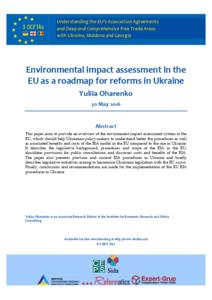
Environmental impact assessment in the EU as a roadmap for reforms in Ukraine
This paper aims to provide an overview of the environment impact assessment system in the EU, which should help Ukrainian policy-makers to understand better the procedures as well as associated benefits and costs of the EIA model in the EU compared…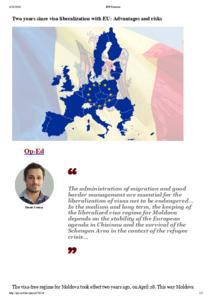
Two years since visa liberalization with EU: Advantages and risks for Moldova
The visa-free regime for Moldova took effect two years ago, on April 28. This way Moldova became the first Eastern Partnership country where the biometric passport owners can travel visa free in the Schengen Area (90 days during 180 days). Thus, the…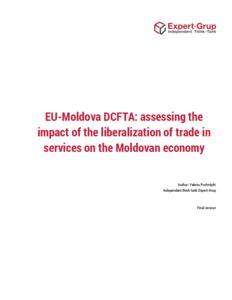
EU-Moldova DCFTA: assessing the impact of the liberalization of trade in services on the Moldovan economy
The year 2014 has been a historical landmark for the Republic of Moldova, as the country has signed with the European Union the Association Agreement. The Agreement enacts a Deep and Comprehensive Free Trade Area (DCFTA). The free trade agreement is…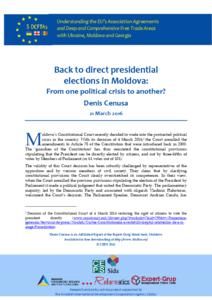
Back to direct presidential elections in Moldova: From one political crisis to another?
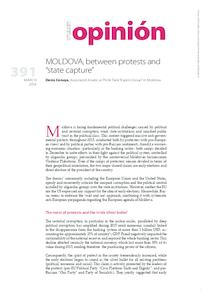
Moldova, Between Protests and “State Capture”
Barcelona Centre for International Affairs (CIDOB), Opinion №. 391. Source...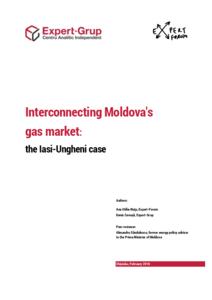
Expanding the Iasi-Ungheni pipeline to Chisinau: challenges and opportunities
The extension of the Iasi-Ungheni pipeline is a major objective for the Moldovan energy sector. Interconnecting Moldova with the gas market in Romania and Europe is the first step to diversify energy sources and routes, which would reduce the monopoly…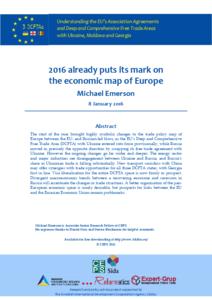
2016 already puts its mark on the economic map of Europe
The start of the year brought highly symbolic changes to the trade policy map of Europe between the EU- and Russian-led blocs, as the EU’s Deep and Comprehensive Free Trade Area (DCFTA) with Ukraine entered into force provisionally, while Russia moved…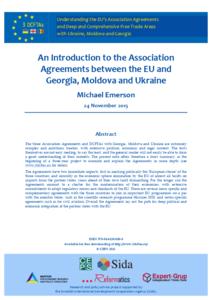
An Introduction to the Association Agreements between the EU and Georgia, Moldova and Ukraine
The three Association Agreements signed between the EU and Ukraine, Moldova and Georgia in 2014 are very long and complex legal texts, incorporating ‘Deep and Comprehensive Free Trade Areas’. Their immediate impact is both political and economic. Politically…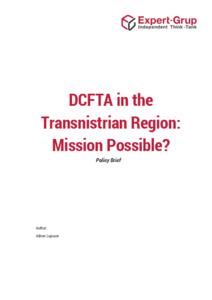
Association Agreement in the Transnistrian Region: Mission Possible?
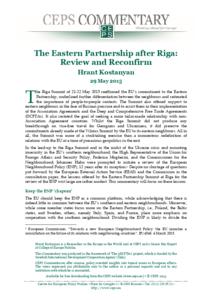
The Eastern Partnership after Riga: Review and Reconfirm
The Riga Summit of 21-22 May reaffirmed the EU’s commitment to the Eastern Partnership, underlined further differentiation between the neighbours and reiterated the importance of people-to-people contacts, finds Hrant Kostanyan in this CEPS Commentary.…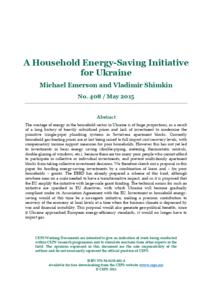
A Household Energy-Saving Initiative for Ukraine
The wastage of energy in the household sector in Ukraine is of huge proportions, as a result of a long history of heavily subsidised prices and lack of investment to modernise the primitive (single-pipe) plumbing systems in Soviet-era apartment blocks.…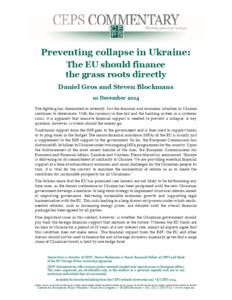
Preventing collapse in Ukraine: The EU should finance the grass roots directly
With the aim of averting the total collapse of the Ukrainian economy, Daniel Gros and Steven Blockmans urge the EU to offer a minimum of macro-financial assistance to improve governance, fight corruption and harmonise laws with the EU acquis, while…